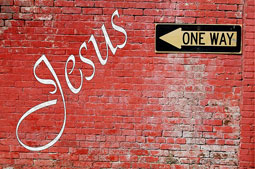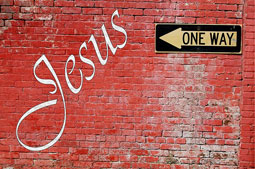 Did you know that Christians have not always been called “Christiansâ€? The earliest apprentices of Jesus only became know by this title later in the first century A.D. in the large, ethnically diverse, Syrian capital of Antioch (Acts 11:26). It’s even likely that the term “Christian†was used by Antioch’s general population as a derogatory name for these followers of Jesus. The title of “Christians†was given because this group of Jews and Gentiles were followers of Jesus, whom they believed to be the Christos, meaning “the anointed one,†or the Messiah.  Throughout the pages of the New Testament these earliest of believers seemed to select other names for themselves like “saints,†“brothers,†and “disciples.â€Â However, in referring to what and who they were following, the earliest self-description we know of is followers of “the Way†(Acts 9:2; 11:26). And this description has no little significance. In describing what we call “Christianity†today as “The Way,†these first followers of Jesus made a radical claim about the person and work of Jesus.Â
Did you know that Christians have not always been called “Christiansâ€? The earliest apprentices of Jesus only became know by this title later in the first century A.D. in the large, ethnically diverse, Syrian capital of Antioch (Acts 11:26). It’s even likely that the term “Christian†was used by Antioch’s general population as a derogatory name for these followers of Jesus. The title of “Christians†was given because this group of Jews and Gentiles were followers of Jesus, whom they believed to be the Christos, meaning “the anointed one,†or the Messiah.  Throughout the pages of the New Testament these earliest of believers seemed to select other names for themselves like “saints,†“brothers,†and “disciples.â€Â However, in referring to what and who they were following, the earliest self-description we know of is followers of “the Way†(Acts 9:2; 11:26). And this description has no little significance. In describing what we call “Christianity†today as “The Way,†these first followers of Jesus made a radical claim about the person and work of Jesus.Â
Torah As ‘The Way’
The Hebrew people (and their own Scriptures) have employed the word “Torah†to describe not only the first five books of the Old Testament (Genesis, Exodus, Leviticus, Numbers, Deuteronomy), but also the entire collection of 39 books which make up the Old Testament. And while English translators often bring the Hebrew word “Torah†over into English Bibles as “decrees,†“judgments,†“commands,†or simply “law,†there’s a much more holistic understanding of Torah. Torah is God’s self-revelation given to humanity. And it conveys much more than just true principles and propositions (though it does contain that too).
Torah has been classically understood by the Hebrew people as laying out the way in which Israel might experience human flourishing. The book of Proverbs displays a constant refrain to the recipient (“my sonâ€) to embrace the particular path of wisdom (the way) being passed down in order that he might experience full life (human flourishing). So, Torah, or God’s Word, comes to be viewed as the singular way in which Israel was to live in order to experience human flourishing. “So,†you might ask, “what does this have to do with the name which the early Christians chose for themselves?â€
Jesus As ‘The Way’
Think about how radical to the Jewish mind it was when Jesus of Nazareth stated, “I am the way and the truth and the life. No one comes to the Father except through me. If you really know me, you will know my Father as well. From now on, you do know him and have seen him†(Jn 14:6-7). Jesus was putting himself on the same level as Torah. He asserted that only as one accessed God the Father through the person of Jesus could one expect to have a relationship with the Father. He daringly maintained that our human flourishing could only be realized by coming in contact with him.
You see, this is one primary way in which Jesus differentiates himself from other religious leaders/thinkers (Krishna, Buddha, Muhammad, Moses, etc.). Such religious icons claim to be “way-showers†or “signposts.â€Â That is, they point away from themselves and to the end or goal of human flourishing. But none claims to actually be “the wayâ€, in and of himself. As John Stott writes in his classic book “Basic Christianity,†“[Jesus] was not just another signpost, but the destination to which the signposts had led.â€Â So, in the midst of the common “way-shower†model of religious leading, Jesus comes along and boasts quite dramatically that, (1) all human sins are, at their root, a sin against himself (Mk 2:1-12; Lk 7:36-50), and that (2) he will return at the end of time to be the final judge of all human beings, and that the nature of their judgment will be dependent on how people have responded to himself (Jn 5:22, 28, 29; Mt 25:31-46). It can’t easily be doubted then that Jesus saw himself as ‘the Way’ to God and therefore, the way to human flourishing.
Jesus’ Apprentices as Followers of ‘The Way’
These first Jewish “Christians†then, understood Jesus to be equal with, even superior to, in function, Torah—God’s self-revelation to humanity. This is what prompts Jesus’ closest follower, John, in his Gospel to write, “In the beginning was the Word [logos], and the Word was with God, and the Word was God. . . .The Word became flesh and made his dwelling among us.†(Jn 1:1, 14). Jesus is the divine logos, the true Torah, who makes God the Father known not just in his words or declarations, but in his very personal presence. He is “the radiance of God’s glory and the exact representation of his being†(Heb 1:3), only because “God was pleased to have all his fullness dwell in him [Jesus], and through him to reconcile to himself all things, whether things on earth or things in heaven, by making peace through his blood, shed on the cross†(Col 1:19, 20).
This is why Christians, or followers of the Way, have the most highly exalted view of Jesus possible. It would be inappropriate, even blasphemous, to offer worship to a mere mortal creature. But what about this Jesus, the God-man? What are we to make of one who, claiming to be “the gate,†then asserts that “all who ever came before me,†and all who “climb in by some other way†are “thieves and robbers†(Jn 10:1-10)? What other response besides worship and adoration is appropriate for the One who was “before all things, and in [whom] all things hold together†(Col 1:17)? To be a “Christian,†Jesus’ contemporaries understood, means nothing more and nothing less than throwing one’s entire life in to follow, and be identified with, the one who is the only door into which anyone may enter human fulfillment and flourishing. To be a Christian, for us too then, is to recognize that Jesus is quite simply, the only Way.
